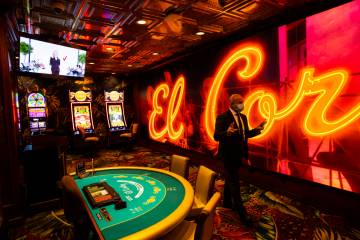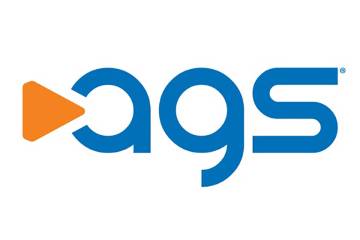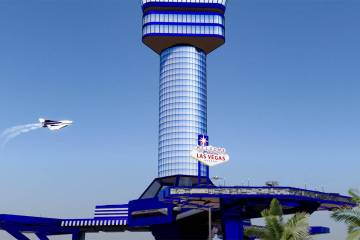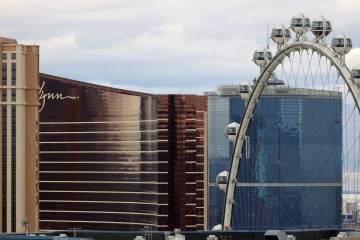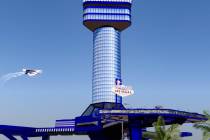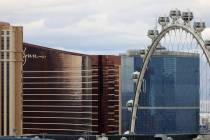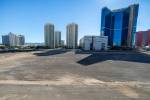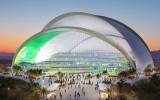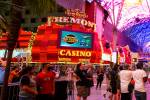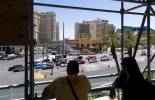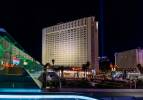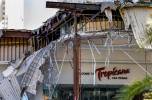Strip land deal revives hope of more transactions
The idea of Strip real estate carrying a value of $30 million an acre or more has come and gone.
This month’s sale of the former New Frontier site — once the Strip’s most expensive piece of real estate — is giving market speculators new hope that resort corridor land transactions could again become active.
“It’s good to have something to talk about once again,” John Knott, executive vice president of CBRE and head of its Global Gaming Group, said Wednesday.
The consulting and real estate division, which was part of several Strip land transactions in the 2000s, said this weekend’s opening of the $415 million SLS Las Vegas could catalyze the next wave of Strip development.
SLS is a renovation of the former Sahara, a real estate transaction that CBRE brokered in 2007 when SBE Entertainment and private equity firm Stockbridge Real Estate acquired it from the late gaming pioneer William Bennett’s family.
Knott said there are signs the market is on a comeback after real estate prices peaked in 2007 when two Israeli companies bought the New Frontier site for more than $1.24 billion, paying about $33 million an acre. The investment markets crumbled and plans for a $5 billion hotel-casino on the site faded.
Earlier this month, Australian billionaire James Packer and investment firm Oaktree Capital bought majority interest in the distressed debt covering the site. The partnership and former Wynn Las Vegas President Andrew Pascal are planning to build a resort on the site.
Even with the anticipated start of construction for the $4 billion Resorts World Las Vegas by Malaysia-based Genting Berhad, Knott said it was highly unlikely Las Vegas will see another CityCenter-sized project in 10 years or more.
“Resorts World is a good-sized development, but it’s being phased in,” Knott said.
Knott was joined by CBRE First Vice President Michael Parks and Brent Pirosch, CBRE’s director of gaming consulting, during a half-hour discussion with local reporters on the Las Vegas gaming real estate market.
Knott said a substantial correction was needed in the market as prices peaked in 2007.
Parks said the glut of high-rise condominiums along the Strip drove up land values. Many of those projects saw diminished sales figures and several of the planned developments were never built.
Meanwhile, the casino industry also suffered a downturn.
“Land values fell by 90 percent,” Knott said. “Property values on operating hotels also fell substantially.”
But signs are pointing in a more positive direction.
Gaming, while no longer the primary driver of Strip revenue, is showing its best numbers since 2008.
On a year-to-date basis, gaming revenue is up 0.3 percent, and is 4.8 percent below the peak that was set in the first six months of 2007.
Pirosch attributes the results to baccarat. Revenue from the game in the first six months of 2014 is up 62.4 percent compared with the first six months of 2007. Mass-market gaming revenue, however, is down 16 percent compared with 2007.
“The story is baccarat,” Pirosch said. “Baccarat represents roughly one-quarter of the gaming market where it used to be around 10 percent.”
Knott said one way the Strip real estate market is being revived is through new hotel-casino operators.
Genting, which operates resorts primarily in Asia, paid about $4 million an acre when the company bought the halted 87-acre Echelon from Boyd Gaming Corp. 18 months ago.
Los Angeles-based SBE is a nightlife, restaurant and hospitality operator. SLS Las Vegas is the company’s first hotel-casino. Packer’s Crown Entertainment operates casinos in Australia and Macau. The billionaire has flirted with the Las Vegas market previously.
Knott said there isn’t much vacant Strip land available. MGM Resorts International has pieces on the north and south sides of the Strip. The company is planning to build a year-round open-air concert venue on 33 acres across from SLS Las Vegas.
“Our view on that is semi-permanent,” Knott said. “MGM will eventually do something else or allow someone else to do to something on the site if (it doesn’t) want to make the investment.”
The activity is helping spur interest in other properties, including the Riviera and the shuttered Fontainebleu development, which halted construction in April 2009.
Billionaire corporate raider Carl Icahn bought the mothballed project out of bankruptcy in 2010 for $150 million.
“We would all like to know what Mr. Icahn is doing,” Knott said. “There have been inquiries made into his organization, but it’s all guesswork.”
Contact reporter Howard Stutz at hstutz@reviewjournal.com or 702-477-3871. Follow @howardstutz on Twitter.








